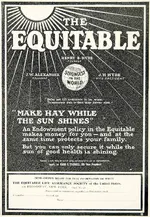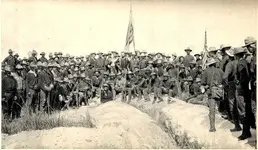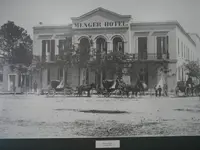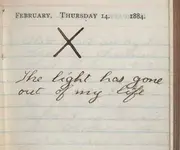Rebel - KGC
Platinum Member
Well, SOME of those very large TRUSTS & Monopolies became INSURANCE Companies "connected" to the Order of American Knights...
...and Teddy's mother's brothers were part of CSA Sec of State Judah P Benjamin's foreign service in England, a second cousin once removed was a CSA Brig Gen Robert Bullock from Ocala.
...and where did Teddy and his Rough Riders visit before arriving in Tampa before shipping out?

L.C. BAKER:
Thank you! I had never heard TR's voice before. Sounds like I thought it would.
I made a mistake concentrating on the source (the platform of the Progressive Party) and not the meaning. It is quite clear, from the text and the context, that Mr. Roosevelt was referring to monopolies and other very large trusts.
Good luck to all,
The Old Bookaroo


Well, SOME of those very large TRUSTS & Monopolies became INSURANCE Companies "connected" to the Order of American Knights...


Were Teddy's Rough Riders, former KGC "soldiers"...?Add Paul Morton to the rough rider mix also. He picked the Rough Riders up around the states on his private train more than once. Teddy spoke of missing it once and how disappointing it was for him. It was a yearly reunion when they got older.
Were Teddy's Rough Riders, former KGC "soldiers"...?
 Merger Hotel in 1865 Notice only black men out front with the carriages
Merger Hotel in 1865 Notice only black men out front with the carriages 
[TABLE="width: 601"]
[TR]
[TD] It was impossible to take any of the numerous companies which were proffered to us from the various States. The only organized bodies we were at liberty to accept were those from the four Territories. But owing to the fact that the number of men originally allotted to us, 780, was speedily raised to 1,000, we were given a chance to accept quite a number of eager volunteers who did not come from the Territories, but who possessed precisely the same temper that distinguished our Southwestern recruits, and whose presence materially benefited the regiment.
[/TD]
[TD][SIZE=-2] 14[/SIZE][/TD]
[/TR]
[TR]
[TD] We drew recruits from Harvard, Yale, Princeton, and many another college; from clubs like the Somerset, of Boston, and Knickerbocker, of New York; and from among the men who belonged neither to club nor to college, but in whose veins the blood stirred with the same impulse which once sent the Vikings over sea. Four of the policemen who had served under me, while I was President of the New York Police Board, insisted on coming—two of them to die, the other two to return unhurt after honorable and dangerous service. It seemed to me that almost every friend I had in every State had some one acquaintance who was bound to go with the Rough Riders, and for whom I had to make a place. Thomas Nelson Page, General Fitzhugh Lee, Congressman Odell, of New York, Senator Morgan; for each of these, and for many others, I eventually consented to accept some one or two recruits, of course only after a most rigid examination into their physical capacity, and after they had shown that they knew how to ride and shoot. I may add that in no case was I disappointed in the men thus taken.
[/TD]
[TD][SIZE=-2] 15[/SIZE][/TD]
[/TR]
[TR]
[TD] Harvard being my own college, I had such a swarm of applications from it that I could not take one in ten. What particularly pleased me, not only in the Harvard but the Yale and Princeton men, and, indeed, in these recruits from the older States generally, was that they did not ask for commissions. With hardly an exception they entered upon their duties as troopers in the spirit which they held to the end, merely endeavoring to show that no work could be too hard, too disagreeable, or too dangerous for them to perform, and neither asking nor receiving any reward in the way of promotion or consideration. The Harvard contingent was practically raised by Guy Murchie, of Maine. He saw all the fighting and did his duty with the utmost gallantry, and then left the service as he had entered it, a trooper, entirely satisfied to have done his duty—and no man did it better. So it was with Dudley Dean, perhaps the best quarterback who ever played on a Harvard Eleven; and so with Bob Wrenn, a quarterback whose feats rivalled those of Dean's, and who, in addition, was the champion tennis player of America, and had, on two different years, saved this championship from going to an Englishman. So it was with Yale men like Waller, the high jumper, and Garrison and Girard; and with Princeton men like Devereux and Channing, the foot-ball players; with Larned, the tennis player; with Craig Wadsworth, the steeple-chase rider; with Joe Stevens, the crack polo player; with Hamilton Fish, the ex-captain of the Columbia crew, and with scores of others whose names are quite as worthy of mention as any of those I have given. Indeed, they all sought entry into the ranks of the Rough Riders as eagerly as if it meant something widely different from hard work, rough fare, and the possibility of death; and the reason why they turned out to be such good soldiers lay largely in the fact that they were men who had thoroughly counted the cost before entering, and who went into the regiment because they believed that this offered their best chance for seeing hard and dangerous service. Mason Mitchell, of New York, who had been a chief of scouts in the Riel Rebellion, travelled all the way to San Antonio to enlist; and others came there from distances as great.
[/TD]
[TD][SIZE=-2] 16[/SIZE][/TD]
[/TR]
[TR]
[TD] Some of them made appeals to me which I could not possibly resist. Woodbury Kane had been a close friend of mine at Harvard. During the eighteen years that had passed since my graduation I had seen very little of him, though, being always interested in sport, I occasionally met him on the hunting field, had seen him on the deck of the Defender when she vanquished the Valkyrie, and knew the part he had played on the Navajoe, when, in her most important race, that otherwise unlucky yacht vanquished her opponent, the Prince of Wales's Britannia. When the war was on, Kane felt it his duty to fight for his country. He did not seek any position of distinction. All he desired was the chance to do whatever work he was put to do well, and to get to the front; and he enlisted as a trooper. When I went down to the camp at San Antonio he was on kitchen duty, and was cooking and washing dishes for one of the New Mexican troops; and he was doing it so well that I had no further doubt as to how he would get on.[/TD]
[/TR]
[/TABLE]
~ The Rough Riders, Theodore Roosevelt (1899)
Good luck to all,
The Old Bookaroo, CM
L.C. BAKER:
You make a great point! What would Teddy Roosevelt know about the Rough Riders? I mean, you can't rely on a lame historian like that!
As for Wiki - you're wrong about that, too. The quote is from TR's book. The little numbers are page numbers, not Wiki footnotes. But don't get hung up on mundane details...
What did Indiana Jones say? "'X' never marks the spot!"
Good luck to all,
The Old Bookaroo, CM

L.C. BAKER:
If you want to bark commands and get a response buy a dog.
Good luck to all,
The Old Bookaroo, CM
Explain his use of the X at the top of this most important entry in his "PERSONAL" diary. View attachment 1397711
